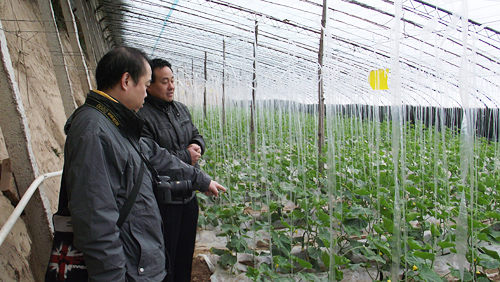|
 |
|
RIGHT IN TIME: An agriculture speicalist (behind) investigates a vegetable greenhouse based on the problems raised by villagers and gives his opinions on how to adjust production (LAN XINZHEN) |
Huo Haizhong, a farmer in Zhuning Village, Shanxi Province, holds a special card in his hand, a card that will help his future. It's not a credit card, nor a debit card or special membership—it's a farmer's card, a large note card where Huo records information about crop yield, farm animals and his family's income. It's also a place where Huo can jot down problems on his farm and make suggestions to the local government.
The farmer's card is being promoted across Zuoquan County. The county began promoting the card in 2008 on a trial basis, and now all 204 villages under its administration have introduced the card.
"By making detailed input and output of each crop, the farmers are able to readjust their production accordingly to earn more money," said Dou Junxiu, Director of the Agricultural Economic Center (AEC) of Zuoquan County.
Each household in rural Zuoquan has such a card. The villagers record their production information, while county and township instructors collect the data each season for analysis. Summaries and solutions are then provided to the government, which in turn provides better policy and economic support to the farmers.
Vast stretches of barren wasteland have led to increases in the poverty rate in Zuoquan County. The growing season is limited to a few months each year. The rest of the year, the farmers take a massive exodus to nearby cities in search of odd jobs.
But 56-year-old Huo no longer goes to the cities. The income of his family of three mainly comes from their 1.33 hectares of land.
In early 2011, Zuoquan County passed out a "farmer's card" to each household. Farmers were instructed to fill in information about their agricultural production, including various problems they had experienced.
The card also contains contact information of relevant government departments that may help villagers to solve their problems.
Huo and other villagers were hesitant to embrace the card, many arguing that this was just another one of the government's publicity stunts, and refused to fill out the cards.
Huo Xiaojun, Chairman of the Villagers' Committee of Zhuning, encouraged his relatives and friends to accept the card. Huo Haizhong eventually gave in, providing the necessary information and citing a pest problem from the previous year's corn crop.
To his surprise, the AEC sent a specialist to the village a few days later and taught him how to get rid of the pests.
Since then, Huo Haizhong has had renewed faith in the local government and the card.
The villagers are required to fill out a card biannually. But whenever Huo comes across a problem, he writes it down in the card, which helps him to resolve the problem quickly. The card has become his link to the agricultural specialists.
The beginning of each year sees Zuoquan entering a slow season. Village officials give their analysis to each household in accordance with the information written on the cards and tell them how to adjust their production to earn more money in the coming year.
Huo Haizhong made 22,000 yuan ($3,358) from selling crops, with his corn sales bringing in about 17,000 yuan ($2,595).
By analyzing Huo Haizhong's card, Huo Xiaojun found the output of each mu (0.067 hectare) of corn exceeded 1,300 yuan ($198), while the output of other crops was only 600 yuan ($91) per mu. If Huo Haizhong grew corn on all his land, his income could double.
| 